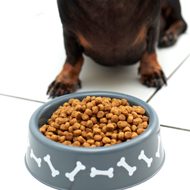Battersea dogs guzzle 50 tonnes of food

Battersea dogs wolfed down more than 42,000 tins of wet food last year.
Lonely hounds at Battersea Dogs and Cats Home wolfed down nearly 50 tonnes of food in 2013 alone, the charity reports. It is the equivalent of four double decker buses, 12 elephants or 660 great Danes.
Battersea fed more than 5,000 dogs last year, getting through 42,384 tins of wet food and 28,672kg of dry food. Not forgetting the 134,000 poo bags staff used to clean up the mess!
Likewise, Battersea cats munched their way through 58,944 pouches of cat food and 1,264kg of cat biscuits.
On average, 13 dogs and eight cats arrived at the rescue home every day in 2013. The charity receives about 1,000 calls each month from people who can no longer care for or afford their pets.
In addition, another 3,451 stray dogs and cats arrived at the charity last year after they were found tied up or wandering the streets.
Battersea recently launched an appeal to raise 1.9m to help build new state-of-the-art kennels for its canine residents.



 The RCVS has announced a new version of its 1CPD mobile app, with enhanced features for veterinary surgeons and veterinary nurses to record their continuing professional development.
The RCVS has announced a new version of its 1CPD mobile app, with enhanced features for veterinary surgeons and veterinary nurses to record their continuing professional development.